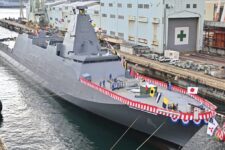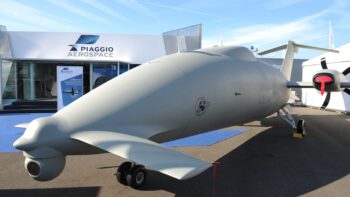
Rep. Joe Courtney, D-Conn., speaks during the news conference to unveil legislation to repeal the impending excise tax on health benefits on Tuesday, April 28, 2015. (Bill Clark/CQ Roll Call)
WASHINGTON — Following a meeting with the Australian prime minister, Rep. Joe Courtney, D-Conn., expressed optimism about the state of the legislative proposals on Capitol Hill needed to facilitate the security pact dubbed AUKUS.
Courtney, and a number of other Democratic and Republican lawmakers, met with Prime Minister Anthony Albanese this morning as he wraps up his visit to the United States this week, which featured meetings at the White House, discussions with President Joe Biden and a Wednesday night state dinner.
The congressmen said legislation related to allowing the foreign military sales case to be opened passed unanimously out of the House Foreign Affairs Committee, and another bill related to laws focused on international arms trafficking, called ITAR, had similar results in a Senate committee.
“I think [those bills] are the probably the two biggest pieces that people are really — I wouldn’t say concerned — but [are] watching closely at this point,” Courtney told a group of reporters today. “Other measures, such as the defense production act authorization to expand the definition of domestic producers to include Australia and the UK… I think it’s in pretty good shape right now.”
RELATED: Rep. Joe Courtney: US Undersea Supremacy Is Only Growing Stronger
Those pieces of legislation, and others, had been paralyzed by the House’s inability to elect a speaker for roughly three weeks. But with Rep. Mike Johnson, R-La., now recently chosen to replace Rep. Kevin McCarthy as the lower chamber’s leader, lawmakers are expected to take up the defense policy bill in the coming weeks. Johnson yesterday highlighted the National Defense Authorization Act as a priority.
Courtney said most lawmakers who are in favor of passing the AUKUS-related provisions largely view the NDAA as the best way to do it.
The state of bureaucratic red tape inhibiting the US from proceeding with its commitments made in the security pact involving the United Kingdom and Australia came under fire earlier this month when the Lucky Country’s top diplomat to the US publicly blasted the slow down as “crazy.”
“What we cannot afford in the future, is the continuation of the most ridiculous manifestations of the ITAR regime,” Kevin Rudd told attendees at a public Washington event on Oct. 12, the Financial Review reported.
Asked about Rudd’s comments today, Courtney said he was “glad” to see the embassies weighing in “as intensely as they are because I think that’s really the critical message.”
And I think the Friends of Australia caucus are certainly prepared to carry that message that … there’s an urgency for implementation to AUKUS [and] that we really can’t … fumble the ball in this year’s NDAA,” he continued.
The House Armed Services Seapower and Projection Forces subcommittee, of which Courtney is the ranking member, received testimony yesterday from several top Navy leaders overseeing submarine construction, maintenance and operations. In their written testimony, the service officials said the legislative proposals the Pentagon sent to Congress this year are “critical” to executing AUKUS.
RELATED: As Albanese visits Biden, Navy tells lawmakers 4 AUKUS Legislative Proposals Are ‘Critical’
Meanwhile, Adm. Ben Key, the head of the UK’s Royal Navy, pushed back on the notion that AUKUS was moving slowly when asked to weigh in on the pace of progress during an interview earlier this month at a Washington think tank
He said that only six months have elapsed since the country’s three leaders made their joint announcement and by comparison, it took more than a decade before the United Kingdom had a nuclear-powered submarine in the water after the US agreed to share its technology in the 1950s.
Key also said there is significant progress being made on AUKUS’s Pillar 2, which focuses on advanced technology sharing unrelated to submarine propulsion, “but, of course, because that hasn’t got a good snappy photograph — I mean how do you — how do you take a photograph of AI? You can’t. Those sorts of things get missed in the narrative.”
“So, under the bonnet, a lot of work is going on. And I think that people need to be really careful about what it is that they’re trying to judge,” Key added.





















